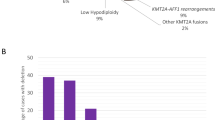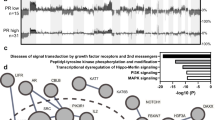Abstract
Clinico-cytogenetic correlations were assessed in 88 patients with malignant ovarian tumours. Cytogenetic analysis of the primary tumours yielded normal karyotype (N) in 33 patients and abnormal karyotypes (A) in 55 patients. Within the A group, seven tumours had simple abnormalities (AS), i.e., numerical changes only or a single structural aberration, and 48 had karyotypes with complex aberrations (AC). A correlation analysis between groups N and A revealed that cytogenetic abnormalities were more often found among seropapillary tumours, and that cases with abnormal karyotypes on average were of higher stage and more often had residual tumour mass after initial surgery (P less than 0.05 for all variables). When the three groups N, AS, and AC were compared, they were found to be significantly different with regard not only to the three parameters mentioned above, but now tumour grade also appeared to correlate with karyotypic pattern (P = 0.001), with poorly differentiated tumours having the most complex karyotypes. In a correlation analysis between karyotypic pattern and survival, group A patients had shorter survival than group N (P = 0.049). In the corresponding analysis between groups N, AS, and AC, the differences were also significant (P = 0.039), with shorter survival in group AC than in groups N and AS. Stage, grade, residual tumour after primary surgery, and performance status also correlated with survival time. A multivariate analysis identified abnormal karyotype as being independently associated with short survival in advanced clinical stages (P = 0.030) of ovarian carcinoma. We conclude that cytogenetic analysis of tumour cells may be of clinical value in the assessment of prognosis in patients with malignant ovarian tumours.
This is a preview of subscription content, access via your institution
Access options
Subscribe to this journal
Receive 24 print issues and online access
$259.00 per year
only $10.79 per issue
Buy this article
- Purchase on Springer Link
- Instant access to full article PDF
Prices may be subject to local taxes which are calculated during checkout
Similar content being viewed by others
Author information
Authors and Affiliations
Rights and permissions
About this article
Cite this article
Pejovic, T., Himmelmann, A., Heim, S. et al. Prognostic impact of chromosome aberrations in ovarian cancer. Br J Cancer 65, 282–286 (1992). https://doi.org/10.1038/bjc.1992.56
Issue Date:
DOI: https://doi.org/10.1038/bjc.1992.56



